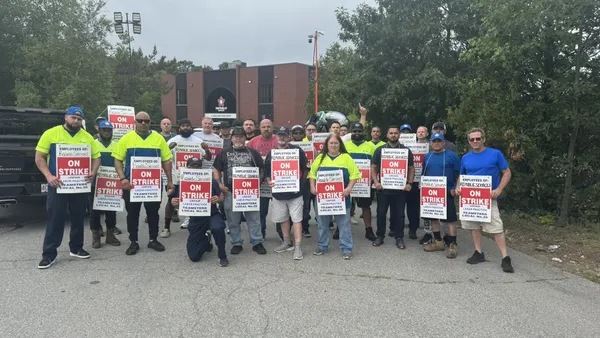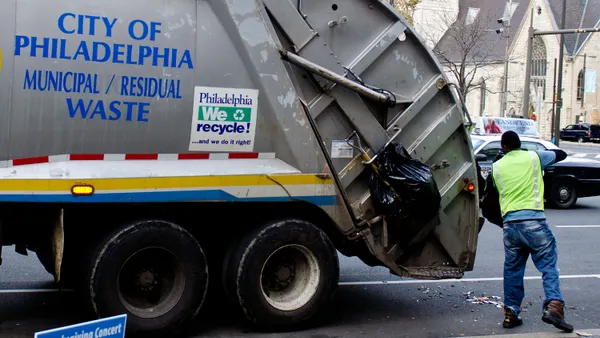Dive Brief:
- A new Greenpeace USA report argues U.S. companies are incorrectly labeling many plastic products as recyclable. The report, "Circular Claims Fall Flat", states only PET #1 and HDPE #2 bottles and jugs are truly recyclable, and that full-body shrink sleeves on those items can also limit their recyclability.
- The survey indicates many MRFs only accept those two types of plastics due to insufficient market demand and processing capabilities. The survey of MRFs nationwide was conducted in partnership with The Last Beach Cleanup.
- Polypropylene (#5) is a notable focal point. The packaging industry has invested in marketing it as recyclable, but Greenpeace found mixed results. According to the report, only 53% of surveyed MRFs take the items and only 31% of U.S. residents have access to polypropylene collection.
Dive Insight:
The new report is likely to further fuel an uptick in conversations about plastics and recyclability. Plastics #3-7s and non-bottle plastics #1-2s were common exports to China and other countries before the recent collapse of international end markets. U.S. MRFs have struggled to find buyers for some of these plastics in the time since, in many cases leading municipalities to drop mixed plastics from their lists of acceptable material.
Greenpeace argues MRF acceptance of those plastics does not verify their recyclability – as MRFs frequently send them to landfills or incinerators if buyers aren't available – and that those items have "negligible-to-negative value" as a result. Items like takeout foodware and single-use plastic bags are seen as contaminants, rather than truly recyclable products. The report directly quotes Waste Management as stating collected plastics with no market demand will be disposed of rather than recycled.
"Companies cannot legitimately place recycle symbols or 'Check Locally' text on products made from plastics #3-7 because MRFs nationwide cannot assure consumers that valueless plastics #3-7 bales will actually be bought and recycled into a new product," the report states.
Under the Federal Trade Commission's (FTC) Green Guides, manufacturers are required to ensure their labeling claims are truthful. Greenpeace says certain consumer goods companies that use these "misleading" recycling labels are "liable and at risk," and it plans to file FTC complaints if they do not "end the deception." Greenpeace cites a pending class-action suit against Keurig Green Mountain over single-use plastic coffee pods as precedent.
The organization caveats that this survey's portrayal of the current situation could change based on updates to recycling access, along with domestic plastics processing capacity and shifts in collected material value. Still, Greenpeace concludes U.S. retailers and consumer goods companies should seek to shift away from using certain plastics given the current infrastructure gap. The report also endorses extended producer responsibility (EPR) as an accountability mechanism.
"The survey shows that many single use plastic food service & convenience items (bags) are not recyclable via municipal systems," Jan Dell of The Last Beach Cleanup told Waste Dive via email. "This finding supports the rationale for banning specific items."
Plastics industry players are likely to push back on the findings, which come amid a turbulent time for recycling as a small number of curbside programs have been reduced or suspended entirely. Overall decline in curbside access is not a major component of the Greenpeace report, but it assumes 5% less access over 2015 levels.
The findings come on the heels of another new report by The Recycling Partnership, a nonprofit supported by consumer goods companies, that found #3-7s have been among "the most commonly removed materials" from curbside programs in recent years. According to the report, the blended value of mixed plastics in October 2019 was far below most commodities at just 9 cents per ton.
But that report diverges from Greenpeace in arguing predominately for a stronger U.S. recycling system to capture existing materials, rather than changing the use of certain plastics. It also argues more North American markets for #3-7s are emerging, saying in particular that "polypropylene should increasingly become a core collected material in curbside programs."
Both reports come amid an uptick in recycling legislation at the federal level. Industry has largely embraced the RECYCLE Act, focused on education and outreach, with some strong support for the RECOVER Act, focused on infrastructure. Players are more skeptical of the recently-introduced Break Free From Plastic Pollution Act, which targets the supply chain, mandates packaging EPR, and moves to ban a number of single-use plastic items.
John Hocevar, a Greenpeace USA campaign director, told Waste Dive the latter bill is "the kind of comprehensive, common-sense approach" the situation requires.
"Most bills to date have failed to address the root cause of our plastic mess, and will not reduce plastic production," he said.









